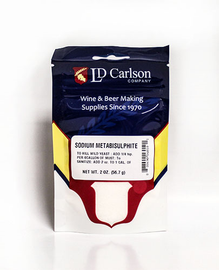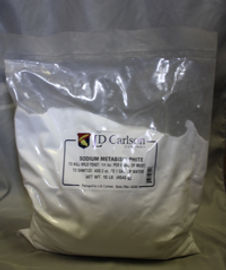Titrets Sulfite Testing Kit
Brand : LD Carlson
- SKU:
- 5412
- UPC:
- 619165402699
- Shipping:
- Calculated at Checkout
Sulfite Test Kit Contains Ten Tests Per Box, Ranges Form 10-100 Mg/L.
Note: Recommended for use with white wines only!
Using Titrets-
1. Collect the sample in any clean container.
2. Push a valve assembly onto the Titret ampoule Tip until it fits snugly. NOTE: The valve assembly should reach the reference line on the neck of the ampoule.
3. Gently snap the tip of the ampoule at the score mark.
4. With the tip of the valve assembly immersed in the sample, squeeze the bead valve briefly to add a small amount of sample to the Titret. The contents will turn a DEEPBLUE color. Wait 30 seconds. NOTE: Do not squeeze the bead valve unless the tip of the valve assembly is immersed below the surface of the liquid.
5. Rock the Titret to mix the contents.
6. Continue to add small amounts of sample until the liquid in the Titret turns from BLUE TO COLORLESS (or the color of your sample).
Be sure to rock the Titret to mix the contents after each addition of sample. When the color of the liquid in the Titret changes to COLORLESS (or the color of your sample), the end point has been reached. Stop the test, hold the Titret with its tip pointed upward and read the scale opposite the liquid level to obtain the test results in ppm (mg/L) free SO2. TEST METHOD: The Sulfite in Wine Titrets®1 test is based on the “Ripper” chemistry which employs an iodide-iodate titrant in an acid solution and a starch indicator2,3,4. The “Ripper” chemistry is used as a screening method throughout the wine making industry for determining the sulfite content in wines. Results are expressed as free SO2. Results for this test kit are acceptable for dry white wines although they can have an error of up to 10 ppm. This test kit is not recommended for use with red wines or white wines containing ascorbic acid or tannin. These wines often give false high test results. As a rule, a test result of greater than 40 ppm free sulfite for any wine should be considered suspect and an alternative sulfite determination method should be employed.











